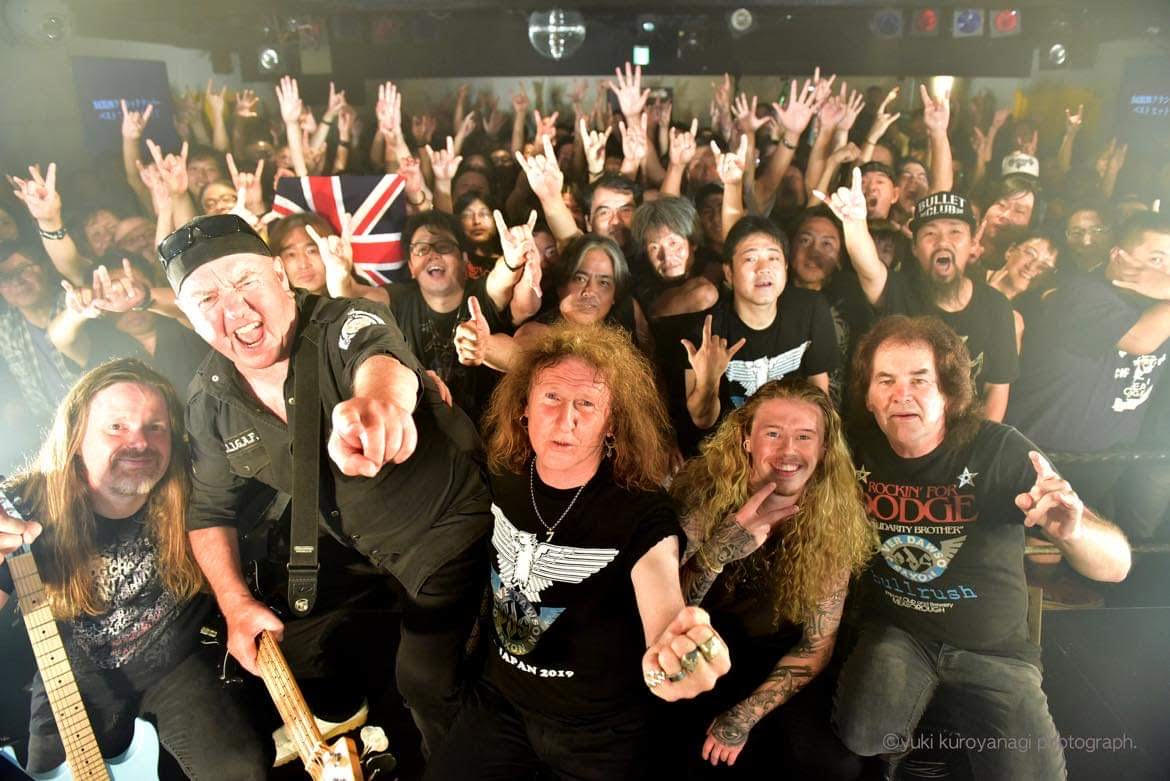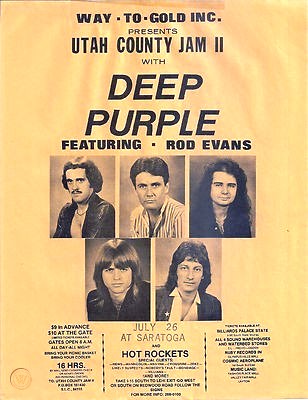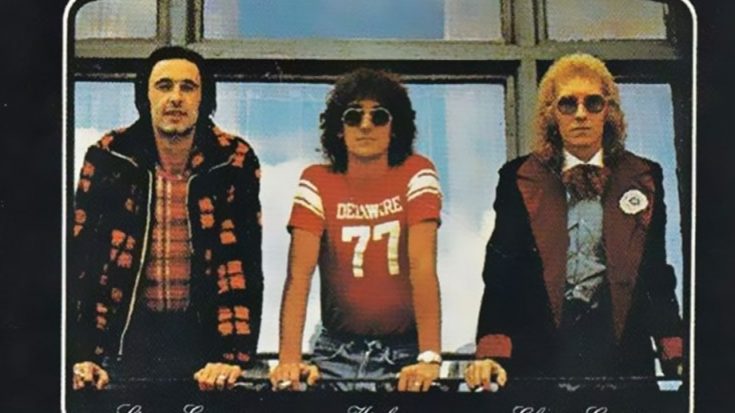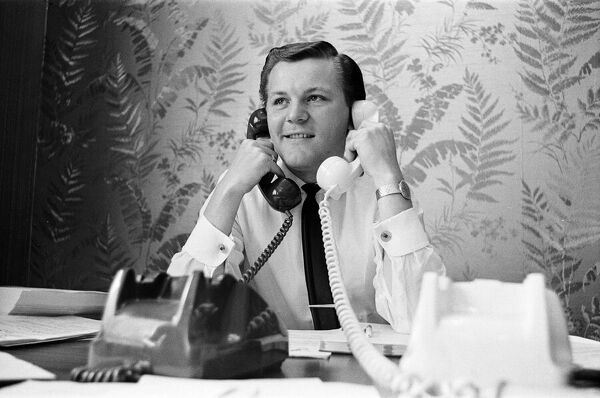Article 33: When is a band not a band?
In 2019, I had the great pleasure of working with UPP-tone in bringing OD Saxon to Japan. The original Saxon had long since fractured into two groups, the aforementioned Oliver/Dawson Saxon and lead vocalist Biff Byford’s band who retained the original name. OD Saxon were superb, the combination of Graham’s guitar and Steve’s bass displaying exactly where the Saxon sound and power came from and with everybody in the original band sharing song writing credits, it can be argued that OD Saxon is just as valid a ‘Saxon’ as Saxon itself. I know of some Rock fans in Japan who didn’t go to the show because it wasn’t ‘Saxon’ as such (more fool them, they missed one hell of a show!) and others that told me they wouldn’t go and see Biff’s Saxon because they felt Graham and Steve were the engine of the original band. Whatever there’s or your choice, it raises the question of exactly when a band should stop being the band as advertised and change their name.
バンドはいつバンドでなくなるのか?
2019年、UPP-toneがOD Saxonを来日させた際、その手伝いをする機会に恵まれた。Saxonはずいぶん前に2つに分裂。前述のOliver/Dawson Saxonと、オリジナルの名前を使っているリード・ヴォーカリストのビフ・バイフォードのバンドだ。OD Saxonは素晴らしかった。グラハムのギターとスティーヴのベースによるコンビネーションは、まさにオリジナルのバンドのメンバー全員が曲作りに参加していたサクソンのサウンドのパワー源が何であるかを示していた。OD Saxonは、Saxonと同じくらいSaxonだと言える。「Saxon」ではないからと、あのショウに行かなかった日本の何人かのロックファンを知っているし(あんな素晴らしいショウを見逃したなんて、バカを見たものだ)、グラハムやスティーヴこそがオリジナル・バンドのエンジンだから、ビフのSaxonは見に行かないというものもいる。彼らの選択が何であれ、これはバンドがいつそのバンドではなくなり、名前を変えるべきなのかという疑問を提示する。

写真 01:日本でのOD Saxon
Photo 01:OD Saxon in Japan
On 27th June, 2015, music lost one of its most original and talented bass players, Chris Russell Edward Squire of Yes. Chris was more than just the bass player in the band though, he was the heart and soul of it. He was the only consistent member from when the band formed in 1968 right through to 2015 playing on every one of their twenty-one studio albums and never missed a gig in his forty-seven years with Yes. It is a remarkable achievement and Progressive Rock fans everywhere bowed their heads respect when they heard the news that he would no longer dominate the stage at Yes’ concerts.
2015年6月27日、音楽界は最もオリジナリティと才能溢れるベース・プレイヤー、イエスのクリス・ラッセル・エドワード・スクワイヤを失った。クリスはバンドではベース・プレイヤー以上の存在であり、その心臓と魂であったと言える。1968年の結成から2015年に至るまでの47年間のイエスの活動中、21枚のスタジオ・アルバムすべてに参加し、一度もギグを欠席しなかった唯一のメンバーである。これは偉業であり、彼がもはやイエスのコンサートを支配することがないというニュースを聞いた世界中のプログレ・ファンは、尊敬の念を込めて頭を下げた。
Starting within days, debates raged on the internet as to whether Yes should carry on as a group. Currently they are on tour with Billy Sherwood playing bass but his replacing Chris was arranged and announced before Chris passed away and done with Chris’ blessing, the thinking at the time being that Chris, being ill, would return to the group at a later date for their annual Cruise To the Edge and the UK and European tours they had booked for 2016 but sadly he never recovered. An interview with drummer Alan White published in America’s Billboard magazine on July 21st 2015 had Alan quoted as saying “It’s certainly going to be hard without him, but he called me and asked me to keep everything going regardless of what happens, so absolutely, we’re moving ahead. I’m going to do it for him” and added that the fans are fine with the decision and that he wanted to ‘maintain the Yes name and meet the high standards of musicianship Chris created.’ Whilst that is very admirable and if anyone should have the right to carry on the name of Yes it would be Alan because he’s the second longest permanent member having joined in 1972, one has to ask the question that without any of its founding members nor any of what is considered the classic line-up of Jon Anderson, Bill Bruford, Rick Wakeman, Steve Howe and Chris Squire in it, is it really Yes? The internet debates continue to this day.
数日のうちに、インターネット上では、イエスというグループが存続すべきかという議論が巻き起こった。現在彼らはビリー・シャーウッドのベースでツアーをしているが、これはクリスの存命中から決まっていたことであり、クリスの承認を得たものだ。当時病床にいたクリスは、16年に決まった恒例の『Cruise to the Edge』やイギリス、ヨーロッパ・ツアーにのちのち復帰するつもりであったが、残念ながら、それはかなわなかった。2015年7月21日にアメリカのビルボード・マガジンに掲載されたインタビューで、ドラマーのアラン・ホワイトは、「彼がいない状況は厳しいけれど、彼には電話で何があっても続けてくれと言われている。だから必ず続けるよ。彼のために」と発言し、ファンもその決定をわかってくれるだろうし、イエスの名前を存続してクリスが作り出した高いミュージシャンシップのスタンダードを保持していくとも言っている。これは称賛に値する話だし、もし誰かがイエスの名を継ぐのであれば、それは1972年に加入した2番目に在籍期間の長いアランであるべきだ。しかし一方で、ジョン・アンダーソン、ビル・ブラフォード、リック・ウェイクマン、スティーヴ・ハウ、クリス・スクワイヤといった創設メンバーやクラシック・ラインナップのメンバーを欠いているバンドが、本当にイエスなのかと問わざるをえない。インターネット上の議論は今も続いている。
Bands form, make great music, change members, split up, reform, break up again, fracture into different bands, claim rights, sue each other and slag each other off in the press, each claiming that they are the real band. All this leaves us, the fans, confused and uncertain about whether the current members of a band are really ‘the band’. When Ozzy left Black Sabbath in 1978, many people thought it was the end of them. Indeed, Ozzy was the front man, the madman and more often than not the spokesman for Sabbath so it was hard to envision a Black Sabbath without him especially when they selected Fleetwood Mac veteran Dave Walker to take the spotlight (a position he occupied for just one TV appearance and no recordings) but then Ronnie James Dio stepped in on vocals and we had Black Sabbath Mk III. The majority of Sabbath fans accepted Ronnie straight away; others took time, some never did and still don’t, insisting that only the original four could be Black Sabbath. Since then, there have been another eleven line-ups, the only consistent member being Tony Iommi so is Tony Iommi Black Sabbath and if not, could Sabbath exist without him if Ozzy, Geezer Butler and Bill Ward recruited another guitarist?
バンドを結成し、素晴らしい音楽を作り、メンバーチェンジをし、解散し、再結成してまた解散し、いくつかのバンドに分かれ、権利を主張し、お互いを訴え、プレスで罵倒し、お互いが自分が本物だと主張する。我々ファンは困惑し、現在のバンド・メンバーが、果たして本物のバンドなのか確信が持てない。1978年にオジーがブラック・サバスを去った時、多くの人がバンドの終わりだと思った。確かにオジーはフロントマンの狂人であり、しばしばサバスのスポークスマンだったから、彼のいないブラック・サバスを想像するのは難しかった。特に彼らがフリートウッド・マックのデイヴ・ウォーカーにスポットライトを当てた時は(一度のテレビ出演のみで、レコーディングには参加していないが)。しかし、その後ロニー・ジェイムズ・ディオが加わり、ブラック・サバス・マークIIIが誕生した。サバス・ファンの多くはロニーをすぐに認め、一部は時間をかけ、また一部はオリジナルの4人こそがサバスだと、いまだに彼を認めていない。以降、サバスには11種類のラインナップが存在しており、唯一ずっと在籍していたのはトニー・アイオミのみ。つまりトニー・アイオミがブラック・サバスなのだ。では、オジー、ギーザー・バトラー、ビル・ワードが別のギタリストを雇った場合、トニー抜きのサバスというのはありうるのだろう?
Deep Purple are another band who sometimes suffer from ‘classic line-up syndrome’. For some, the Mk II version with Ritchie Blackmore and Jon Lord is the only version worth listening to. Others think that Deep Purple finished when Ritchie left whilst others – myself included – think the current line-up with Steve Morse and Don Airey are writing better music now than any Deep Purple since Ian Gillan first left in 1973. Ian of course is now back in the band but that doesn’t mean some fans think Deep Purple is Ian Gillan – not by a long way – but they will argue that Ian along with original drummer Ian Paice and classic line-up bassist Roger Glover are more than worthy of continuing the name today. Ritchie of course formed Ritchie Blackmore’s Rainbow and with a name like that, it’s fairly obvious that without Ritchie, there could be no Rainbow and that proved to be the case when ex-members have come together to play Rainbow’s music but as good as it was, was missing one very big ingredient – Ritchie himself.
ディープ・パープルも、時に「クラシック・ラインナップ・シンドローム」に苦しめられるバンドだ。リッチー・ブラックモアとジョン・ロードのいるMK IIのみが聴くに値すると言うものもいる。リッチーが去った時にディープ・パープルは終わったと言うものもいるし、俺も含め、スティーヴ・モース、ドン・エイリーのいる現在のラインナップは、1973年にイアン・ギランが去って以降のいかなるディープ・パープルよりも良い音楽を書いていると思うものもいる。確かに今はイアンが戻っているが、一部のファンは、だからと言ってイアンがディープ・パープルだと思うはずもないが、彼らはディープ・パープルの名前を守るよりも、イアンがオリジナル・ドラマーのイアン・ペイス、クラシック・ラインナップ期のベーシスト、ロジャー・グローヴァーと一緒にやっていることの方に価値があると主張するだろう。リッチーは、リッチー・ブラックモアズ・レインボーを結成したが、何しろこんな名前であるから、リッチー抜きのレインボーがありえないことはかなり明白であるし、実際元のメンバーたちが集まってレインボーの音楽をプレイし た際も、悪くはなかったにしても、リッチー自身という大きな成分を欠いていたものだ。

写真 02:1980年のディープ・パープル。マジで?
Photo 02:Deep Purple in 1980. Oh really?
Then there is the strange case of Asia. I worked with Asia in 1989 when the line-up was John Wetton, Carl Palmer, John Young and Alan Darby or Asia Mk IV. It certainly sounded like Asia and the fans accepted it as Asia but this line-up only lasted five shows. Formed in 1981, the line-up of Wetton, Palmer, Steve Howe, and Geoff Downes, they released a debut album that sold over ten million copies worldwide. A second album was released two years later with the same members but the line-up was unstable for the next few years and changed most significantly when John Payne replaced John Wetton in 1991. The name of Asia continued with guitarists and drummers coming and going at an alarming rate and no one ever seemed to know who was in the band from one week to the next apart from Geoff Downes and John Payne. Then in 2006, Downes left Asia to join…Asia! The original quartet had decided to reunite but the problem was, John Payne now owned the rights to the name and continued to tour using it as was his right but a lot of fans came to the gigs expecting to see John Wetton et al because it had been announced in the press that they were back together. Thus, it was that for a while, there were two bands named Asia: one of which contained no original or classic line up members at all. Eventually and agreement was reached between the two bands that Payne could continue under the name ‘Asia featuring John Payne’. Some people thought this odd but he was the front-man of the band for fifteen years and through default, owned the name so he was perfectly within his rights to do so. His Asia morphed into a new band called GPS which wrote new music and released new albums under that name but they still played Asia songs onstage which confused the casual concert goers even more; ‘Why are they playing Asia songs when they are not called Asia and nobody in the band is in Asia?’
エイジアの場合は奇妙だ。俺は1989年、ジョン・ウェットン、カール・パーマー、ジョン・ヤング、アラン・ダービーというラインナップのエイジアMk IVと仕事をしたことがある。サウンド的にもエイジアっぽかったし、ファンもエイジアとして認めていたけれど、このラインナップはショウ5回しか続かなかった。1981年に、ウェットン、パーマー、スティーヴ・ハウ、そしてジェフ・ダウンズというラインナップで結成され、デビューアルバムは世界で1000万枚以上売れた。セカンド・アルバムは同じメンバーで2年後にリリースされたが、その後はラインナップは安定せず、1991年にジョン・ウェットンからジョン・ペインに変わった時は特に顕著だった。ギタリストやドラマーが脅威的な速度で変わり続け、来週にはジェフ・ダウンズとジョン・ペイン以外のメンバーがどうなっているのか、誰も知らないという有様。そして2006年、ダウンズがエイジアに加入するためにエイジアを脱退!オリジナルの4人が再結成を決めたが、問題はジョン・ペインが名前の権利を持っており、エイジアの名前でツアーをしていたのだ。だが、再結成のニュースを聞いた多くのファンは、ジョン・ウェットンらを見にコンサートにやってきていた。そういう訳で、しばらく2つのエイジアが存在していた。うち1つはオリジナル、あるいはクラシック・ラインナップのメンバーは1人もいなかった。結局2つのバンドの間で合意がなされ、ペインは「Asia featuring John Payne」という名前を使い続けられることになった。これを奇妙だと感じるものもいたが、彼はバンドのフロントマンを15年も務めたのであり、名前を所持していたのだから、そうするのは完璧に彼の権利内のことだった。彼のエイジアは、新曲を書きニュー・アルバムをリリースするGPSという新たなバンドへと変身したが、ステージではエイジアの曲も演奏し続けたため、熱心ではないファンたちを「バンド名もエイジアではないし、エイジアのメンバーもいないバンドがなぜエイジアの曲を演奏するのだ」と、より一層混乱させた。
Rights to the names of bands can be tricky but just because you own it, it doesn’t mean you should use it. In 1974, Clifford Davis was the manager of Fleetwood Mac and owned the name - or so he claimed - and the band was in turmoil with falling album sales, cancelled tours and internal personal problems. Davis put together a new Fleetwood Mac without any actual Fleetwood Mac members and sent them out on tour, telling them that Mick Fleetwood and some of the others from the band would be joining them at a later date. Amazingly, the fake Fleetwood Mac fell for this and set off around America as did Fleetwood Mac’s road crew who went with them. Everybody soon realized what was happening though after the first show and the tour quickly dissolved. The resulting lawsuit stopped the real Fleetwood Mac working for a year and it emerged that even though the band was named after Mick Fleetwood and John McVie, they did not own their own name having signed a contract many years previously, forfeiting their rights to it.
名前の権利はトリッキーになりうるが、それを所有しているからといって、必ずしも使わなくてはいけないという訳ではない。1974年、クリフォード・デイヴィスはフリートウッド・マックのマネージャーであり、バンド名も所有していた、もしくはそう主張していた。アルバムのセールスの落ち込み、ツアーのキャンセル、バンド内の個人的問題で、バンドは混乱していた。デイヴィッドは、フリートウッド・マックのメンバーが1人もいない新しいフリートウッド・マックを作り、「ミック・フリートウッドや他のバンドのメンバーが後から行くから」と、ツアーに送り出した。驚いたことに、偽フリートウッド・マックはこれに騙され、フリートウッド・マックのクルーとともにアメリカに出発。だが、最初のショウの後、みんなすぐに何が起こっているかを認識し、ツアーはすぐに解散。結果引き起こされた裁判のせいで、本物のフリートウッド・マックは一年の活動停止を余儀なくされた。また、マイク・フリートウッドとジョン・マックヴィーの名前からバンド名がとられているにもかかわらず、何年も前にサインした契約により、彼らが名前の権利を所有していないことが明らかになった。

写真 03:驚くなかれ、これが「フリートウッド・マック」とされたのだ
Photo 03:Believe it or not, this was ‘a’ Fleetwood Mac.
Back to Deep Purple and in 1980, they were touring the USA again – or so it seemed. In actual fact, it was Rod Evans, their original singer who had sung on Deep Purple’s first three albums. He was touring with some unknown session players under the name ‘Deep Purple’. It was put together by a rather dubious management company (who had also put together a Steppenwolf with no original members) and it didn’t take long before fans realized they had been conned and the real Deep Purple management sued. Poor Rod found himself making different headlines, in court and having to pay $672,000 for using the name without permission. He also lost his rights to royalties from the sales of those first three albums.
1980年のディープ・パープルに戻ろう。彼らは再びアメリカをツアーしていた、あるいはそう思われた。実際のところ、それはディープ・パープルの最初の3枚のアルバムで歌っていたロブ・エヴァンスだった。彼は、無名のセッション・プレイヤーたちと、「ディープ・パープル」名義でツアーをしていたのだ。これは怪しげなマネジメント会社が企画したもので(彼らはオリジナル・メンバーが1人もいないステッペンウルフの企画もした)、ファンが騙されと気づき、本物のディープ・パープルのマネジメントが告訴するまでに時間はかからなかった。哀れなロッドは裁判で、許可なしに名前を使用したカドで$672,000を支払う羽目になった。彼はまた、最初の3枚のアルバム・セールスのロイヤリティに対する権利も失った。
Fake groups with different line-ups are nothing new. In the 1960’s there was only the music press and TV where you could see your favourite stars and pictures in magazines were of low quality and TV sets had a 12” monochrome picture which meant that fans often didn’t really know what the members really looked like. Thus, it was not unknown for dubious promoters to put together three local black women and advertise them as The Supremes for example and a particularly unscrupulous man in the UK in the 1960s named Roy Tempest advertised and sold tickets to shows by The Shirelles, The Drifters, The Platters, The Crystals, The Ronettes and others, none of which had any of the actual group in at all; they were all imposters.
違うラインナップの偽物グループというのは昔からある。60年代にはお気に入りのスターを見られるのは、音楽雑誌とテレビだけ。雑誌の写真のクオリティは低く、テレビは12インチの白黒であり、つまりファンたちはメンバーがどんな外見なのか、よくわかっていなかった。だから、怪しげなプロモーターたちは、例えば3人の地元の黒人女性を集め、シュープリームスだと宣伝したりしたのだ。60年代のイギリスのとりわけ悪辣な男、ロイ・テンペストは、シュレルズ、ドリフターズ、プラターズ、クリスタルズ、ロネッツらのショウを宣伝し、チケットを売ったが、その中に本物のグループは一つもおらず、すべてがインチキだった。

写真 04:ロイ・テンペスト
Photo 04:Roy Tempest
Going back to the original Yes/Sabbath questions posed above, for me, if there are no original members in a band or the majority of a classic line-up is not present - as now with Yes – I’m reluctant to go and see the musicians play if they use the name of the band especially at today’s inflated ticket prices; I may as well go and see a tribute band who are just as good and pay an awful lot less. That said, I was fortunate enough to see Yes several times in the seventies with that classic line-up so I don’t have the need or desire to see the Yes of today. I’d be more than happy to see them play the music if they advertised themselves as ‘An evening of Yes music’ or something similar but using the name of Yes seems wrong to me, just as wrong as Rod Evans’ Deep Purple. Black Sabbath eventually resurfaced with Ronnie but called themselves Heaven & Hell which I thought was a great idea as it represents the era they were together; a kind of band within a band. I very quickly bought a ticket to see Heaven & Hell.
上述のオリジナル・イエス/サバスの話に戻ると、俺としては、もし今のイエスのように、オリジナル・メンバーが一切いない、もしくはクラシック・ラインナップの大半がいないのであれば、特に現在のチケット価格のインフレを考えると、そのミュージシャンたちの演奏を見に行こうとは思えない。同じくらい素晴らしく、ずっと値段が安ければ、トリビュート・バンドを見に行きはするかもしれないけれど。とは言え、俺は70年代にあのクラシック・ラインナップのイエスを何度か見る機会に恵まれたから、今のイエスを見る必要も欲望もないのだが。「イエスの音楽の夕べ」などと銘打たれているのであれば、見に行きたいとも思うが、イエスの名前を使うのは、俺は正しいとは思えない。ロッド・エヴァンスのディープ・パープルと同じくらいね。ブラック・サバスはロニーを再び迎え入れたが、彼らは自分たちをヘヴン・アンド・ヘルと称していた。これはロニーがいた時代を表象する素晴らしいアイデアだと思う。バンド内のバンドのようなね。ヘヴンアンド・ヘルのチケットは即刻買ったよ。
You will all have your own opinion of this and there is no right or wrong opinion. Just how many members it takes to constitute the name of a band varies from fan to fan and from band to band. When all is said and done though, the great music of the 1970’s Rock bands should not die just because their band members do, it should live on as a memorial to them. Who plays it, the willingness to pay the admission fee and under what name you are happy to accept it being played, is down to personal taste.
これについては、みんなそれぞれの意見があるだろうし、どれが正しいとか間違っているということではない。何人のメンバーが残っていれば、バンド名を使い続けることができるのかについては、ファンやバンドによって変わってくるだろう。つまるところ、1970年代のロックバンドによる偉大なる音楽は、バンドのメンバーが死んだからと言って、一緒に死んでしまうべきではないということ。それらは彼らの記念碑として生き続けるべきなのだ。誰が演奏するのか、喜んで入場料を払えるか、使われる名前を喜んで受け入れられるかは、個人的のテイスト次第である。
Copyright © 2022 Upp-tone music Co., Ltd. All Rights Reserved.